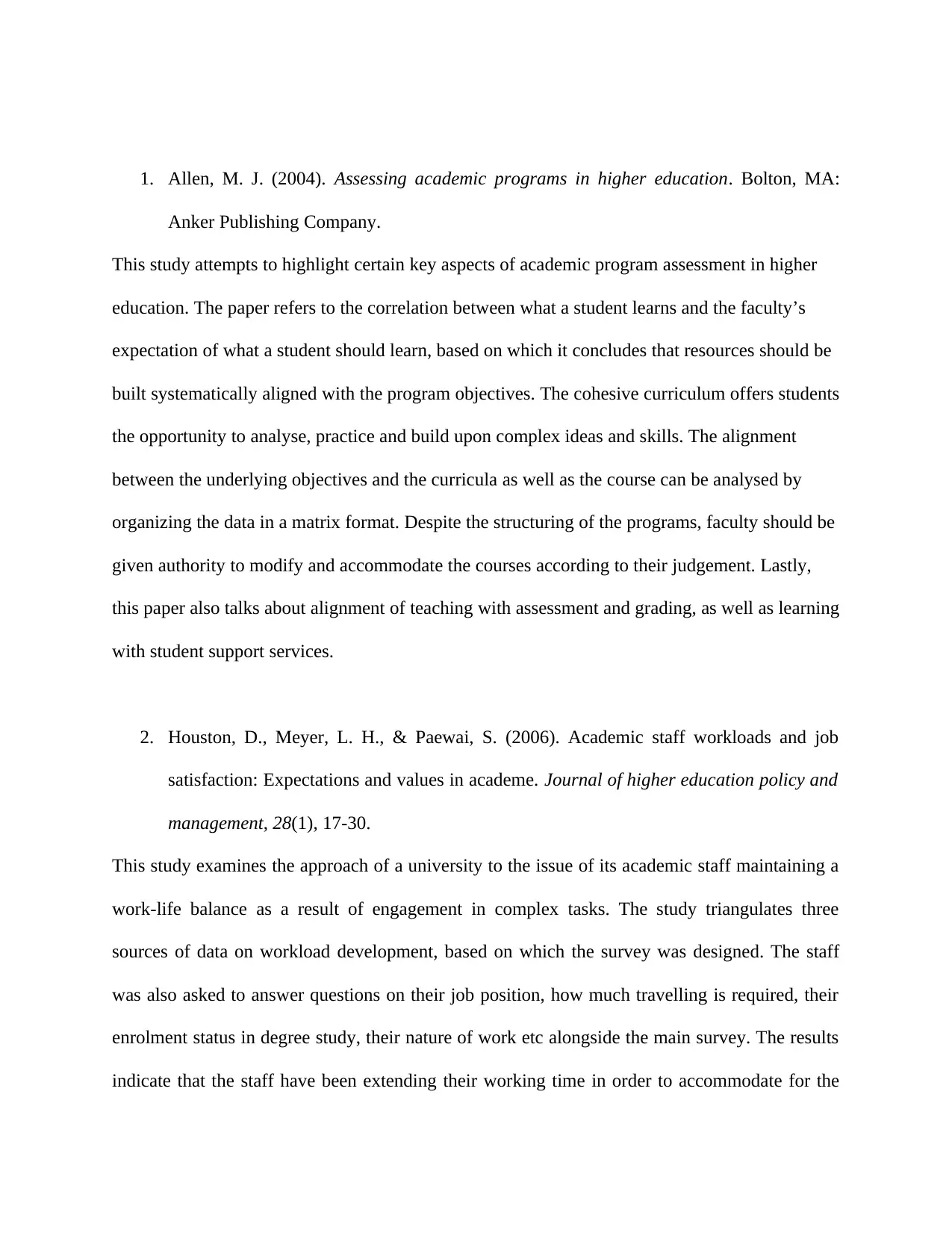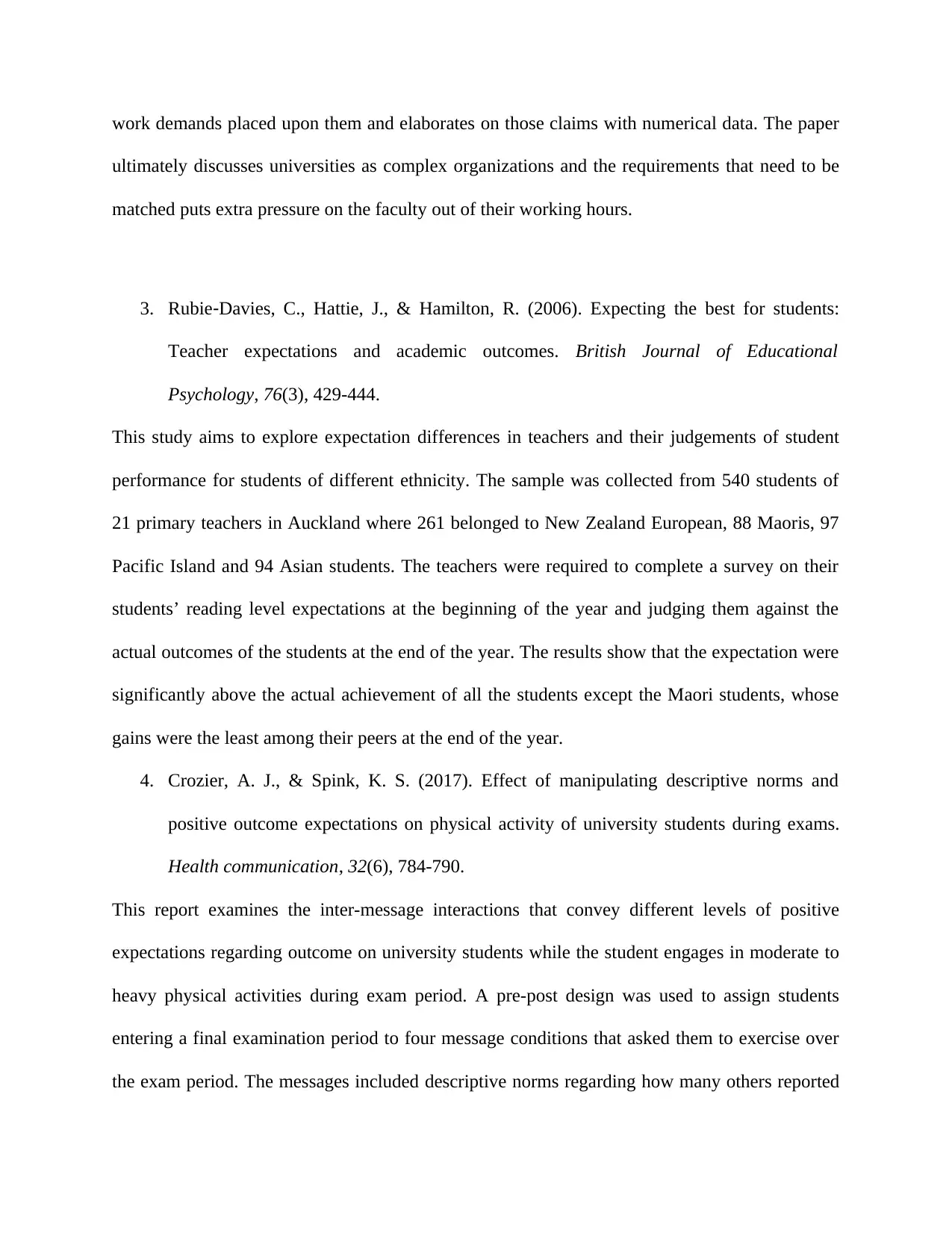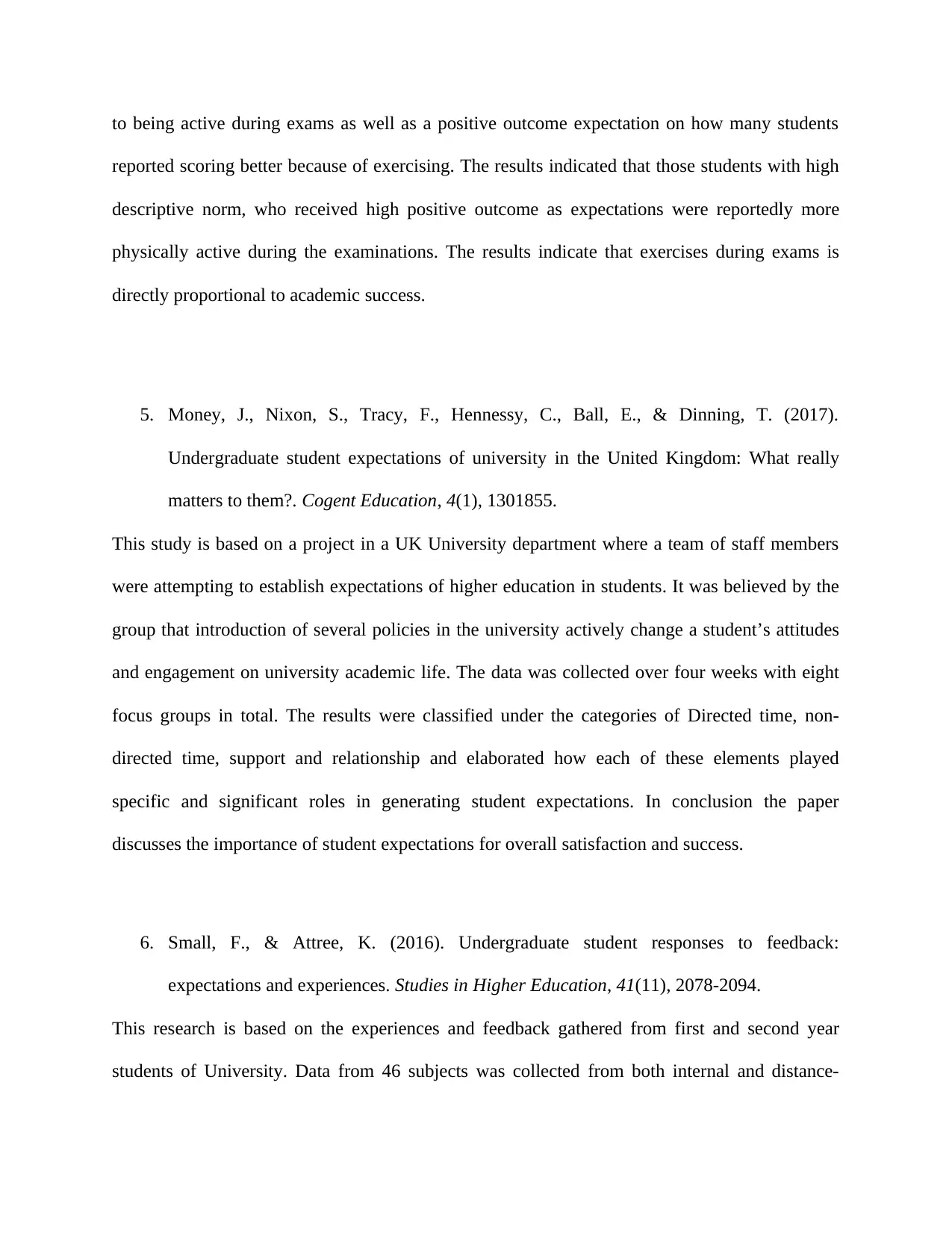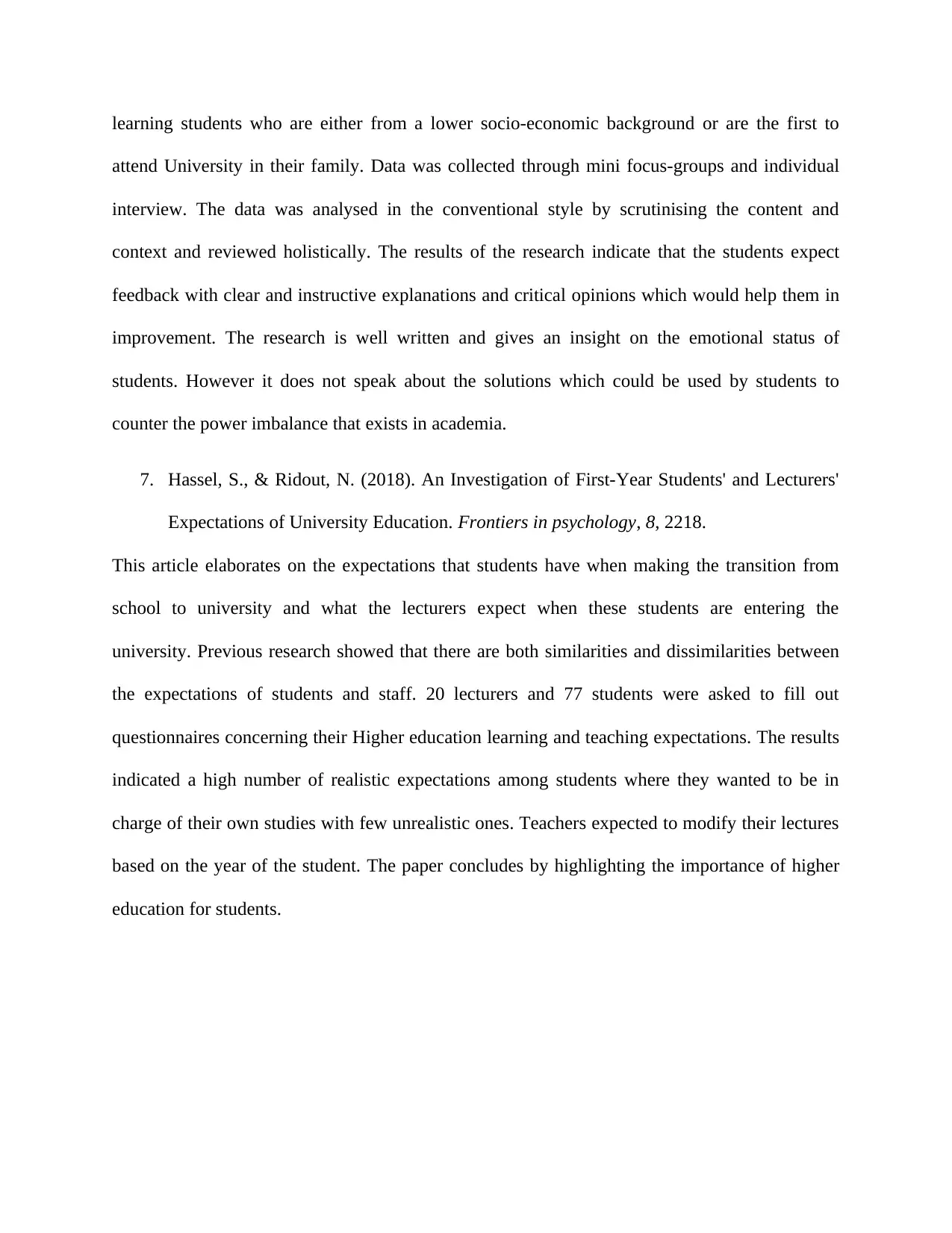Expectations and Outcomes in Higher Education: A Research Report
VerifiedAdded on 2022/11/28
|4
|1214
|155
Report
AI Summary
This report synthesizes several research papers on higher education, examining student and faculty expectations, academic outcomes, and the alignment of curriculum and resources. The studies explore topics such as academic program assessment, work-life balance for academic staff, the impact of teacher expectations on student performance, the effects of exercise during exams, and student expectations of university life. The report highlights the importance of student feedback, clear expectations, and support services in fostering student satisfaction and success. It also addresses the roles of directed and non-directed time, support systems, and relationships in shaping student expectations. The findings underscore the need for universities to consider these factors to improve the overall educational experience and ensure positive outcomes for students.

1. Allen, M. J. (2004). Assessing academic programs in higher education. Bolton, MA:
Anker Publishing Company.
This study attempts to highlight certain key aspects of academic program assessment in higher
education. The paper refers to the correlation between what a student learns and the faculty’s
expectation of what a student should learn, based on which it concludes that resources should be
built systematically aligned with the program objectives. The cohesive curriculum offers students
the opportunity to analyse, practice and build upon complex ideas and skills. The alignment
between the underlying objectives and the curricula as well as the course can be analysed by
organizing the data in a matrix format. Despite the structuring of the programs, faculty should be
given authority to modify and accommodate the courses according to their judgement. Lastly,
this paper also talks about alignment of teaching with assessment and grading, as well as learning
with student support services.
2. Houston, D., Meyer, L. H., & Paewai, S. (2006). Academic staff workloads and job
satisfaction: Expectations and values in academe. Journal of higher education policy and
management, 28(1), 17-30.
This study examines the approach of a university to the issue of its academic staff maintaining a
work-life balance as a result of engagement in complex tasks. The study triangulates three
sources of data on workload development, based on which the survey was designed. The staff
was also asked to answer questions on their job position, how much travelling is required, their
enrolment status in degree study, their nature of work etc alongside the main survey. The results
indicate that the staff have been extending their working time in order to accommodate for the
Anker Publishing Company.
This study attempts to highlight certain key aspects of academic program assessment in higher
education. The paper refers to the correlation between what a student learns and the faculty’s
expectation of what a student should learn, based on which it concludes that resources should be
built systematically aligned with the program objectives. The cohesive curriculum offers students
the opportunity to analyse, practice and build upon complex ideas and skills. The alignment
between the underlying objectives and the curricula as well as the course can be analysed by
organizing the data in a matrix format. Despite the structuring of the programs, faculty should be
given authority to modify and accommodate the courses according to their judgement. Lastly,
this paper also talks about alignment of teaching with assessment and grading, as well as learning
with student support services.
2. Houston, D., Meyer, L. H., & Paewai, S. (2006). Academic staff workloads and job
satisfaction: Expectations and values in academe. Journal of higher education policy and
management, 28(1), 17-30.
This study examines the approach of a university to the issue of its academic staff maintaining a
work-life balance as a result of engagement in complex tasks. The study triangulates three
sources of data on workload development, based on which the survey was designed. The staff
was also asked to answer questions on their job position, how much travelling is required, their
enrolment status in degree study, their nature of work etc alongside the main survey. The results
indicate that the staff have been extending their working time in order to accommodate for the
Paraphrase This Document
Need a fresh take? Get an instant paraphrase of this document with our AI Paraphraser

work demands placed upon them and elaborates on those claims with numerical data. The paper
ultimately discusses universities as complex organizations and the requirements that need to be
matched puts extra pressure on the faculty out of their working hours.
3. Rubie‐Davies, C., Hattie, J., & Hamilton, R. (2006). Expecting the best for students:
Teacher expectations and academic outcomes. British Journal of Educational
Psychology, 76(3), 429-444.
This study aims to explore expectation differences in teachers and their judgements of student
performance for students of different ethnicity. The sample was collected from 540 students of
21 primary teachers in Auckland where 261 belonged to New Zealand European, 88 Maoris, 97
Pacific Island and 94 Asian students. The teachers were required to complete a survey on their
students’ reading level expectations at the beginning of the year and judging them against the
actual outcomes of the students at the end of the year. The results show that the expectation were
significantly above the actual achievement of all the students except the Maori students, whose
gains were the least among their peers at the end of the year.
4. Crozier, A. J., & Spink, K. S. (2017). Effect of manipulating descriptive norms and
positive outcome expectations on physical activity of university students during exams.
Health communication, 32(6), 784-790.
This report examines the inter-message interactions that convey different levels of positive
expectations regarding outcome on university students while the student engages in moderate to
heavy physical activities during exam period. A pre-post design was used to assign students
entering a final examination period to four message conditions that asked them to exercise over
the exam period. The messages included descriptive norms regarding how many others reported
ultimately discusses universities as complex organizations and the requirements that need to be
matched puts extra pressure on the faculty out of their working hours.
3. Rubie‐Davies, C., Hattie, J., & Hamilton, R. (2006). Expecting the best for students:
Teacher expectations and academic outcomes. British Journal of Educational
Psychology, 76(3), 429-444.
This study aims to explore expectation differences in teachers and their judgements of student
performance for students of different ethnicity. The sample was collected from 540 students of
21 primary teachers in Auckland where 261 belonged to New Zealand European, 88 Maoris, 97
Pacific Island and 94 Asian students. The teachers were required to complete a survey on their
students’ reading level expectations at the beginning of the year and judging them against the
actual outcomes of the students at the end of the year. The results show that the expectation were
significantly above the actual achievement of all the students except the Maori students, whose
gains were the least among their peers at the end of the year.
4. Crozier, A. J., & Spink, K. S. (2017). Effect of manipulating descriptive norms and
positive outcome expectations on physical activity of university students during exams.
Health communication, 32(6), 784-790.
This report examines the inter-message interactions that convey different levels of positive
expectations regarding outcome on university students while the student engages in moderate to
heavy physical activities during exam period. A pre-post design was used to assign students
entering a final examination period to four message conditions that asked them to exercise over
the exam period. The messages included descriptive norms regarding how many others reported

to being active during exams as well as a positive outcome expectation on how many students
reported scoring better because of exercising. The results indicated that those students with high
descriptive norm, who received high positive outcome as expectations were reportedly more
physically active during the examinations. The results indicate that exercises during exams is
directly proportional to academic success.
5. Money, J., Nixon, S., Tracy, F., Hennessy, C., Ball, E., & Dinning, T. (2017).
Undergraduate student expectations of university in the United Kingdom: What really
matters to them?. Cogent Education, 4(1), 1301855.
This study is based on a project in a UK University department where a team of staff members
were attempting to establish expectations of higher education in students. It was believed by the
group that introduction of several policies in the university actively change a student’s attitudes
and engagement on university academic life. The data was collected over four weeks with eight
focus groups in total. The results were classified under the categories of Directed time, non-
directed time, support and relationship and elaborated how each of these elements played
specific and significant roles in generating student expectations. In conclusion the paper
discusses the importance of student expectations for overall satisfaction and success.
6. Small, F., & Attree, K. (2016). Undergraduate student responses to feedback:
expectations and experiences. Studies in Higher Education, 41(11), 2078-2094.
This research is based on the experiences and feedback gathered from first and second year
students of University. Data from 46 subjects was collected from both internal and distance-
reported scoring better because of exercising. The results indicated that those students with high
descriptive norm, who received high positive outcome as expectations were reportedly more
physically active during the examinations. The results indicate that exercises during exams is
directly proportional to academic success.
5. Money, J., Nixon, S., Tracy, F., Hennessy, C., Ball, E., & Dinning, T. (2017).
Undergraduate student expectations of university in the United Kingdom: What really
matters to them?. Cogent Education, 4(1), 1301855.
This study is based on a project in a UK University department where a team of staff members
were attempting to establish expectations of higher education in students. It was believed by the
group that introduction of several policies in the university actively change a student’s attitudes
and engagement on university academic life. The data was collected over four weeks with eight
focus groups in total. The results were classified under the categories of Directed time, non-
directed time, support and relationship and elaborated how each of these elements played
specific and significant roles in generating student expectations. In conclusion the paper
discusses the importance of student expectations for overall satisfaction and success.
6. Small, F., & Attree, K. (2016). Undergraduate student responses to feedback:
expectations and experiences. Studies in Higher Education, 41(11), 2078-2094.
This research is based on the experiences and feedback gathered from first and second year
students of University. Data from 46 subjects was collected from both internal and distance-
⊘ This is a preview!⊘
Do you want full access?
Subscribe today to unlock all pages.

Trusted by 1+ million students worldwide

learning students who are either from a lower socio-economic background or are the first to
attend University in their family. Data was collected through mini focus-groups and individual
interview. The data was analysed in the conventional style by scrutinising the content and
context and reviewed holistically. The results of the research indicate that the students expect
feedback with clear and instructive explanations and critical opinions which would help them in
improvement. The research is well written and gives an insight on the emotional status of
students. However it does not speak about the solutions which could be used by students to
counter the power imbalance that exists in academia.
7. Hassel, S., & Ridout, N. (2018). An Investigation of First-Year Students' and Lecturers'
Expectations of University Education. Frontiers in psychology, 8, 2218.
This article elaborates on the expectations that students have when making the transition from
school to university and what the lecturers expect when these students are entering the
university. Previous research showed that there are both similarities and dissimilarities between
the expectations of students and staff. 20 lecturers and 77 students were asked to fill out
questionnaires concerning their Higher education learning and teaching expectations. The results
indicated a high number of realistic expectations among students where they wanted to be in
charge of their own studies with few unrealistic ones. Teachers expected to modify their lectures
based on the year of the student. The paper concludes by highlighting the importance of higher
education for students.
attend University in their family. Data was collected through mini focus-groups and individual
interview. The data was analysed in the conventional style by scrutinising the content and
context and reviewed holistically. The results of the research indicate that the students expect
feedback with clear and instructive explanations and critical opinions which would help them in
improvement. The research is well written and gives an insight on the emotional status of
students. However it does not speak about the solutions which could be used by students to
counter the power imbalance that exists in academia.
7. Hassel, S., & Ridout, N. (2018). An Investigation of First-Year Students' and Lecturers'
Expectations of University Education. Frontiers in psychology, 8, 2218.
This article elaborates on the expectations that students have when making the transition from
school to university and what the lecturers expect when these students are entering the
university. Previous research showed that there are both similarities and dissimilarities between
the expectations of students and staff. 20 lecturers and 77 students were asked to fill out
questionnaires concerning their Higher education learning and teaching expectations. The results
indicated a high number of realistic expectations among students where they wanted to be in
charge of their own studies with few unrealistic ones. Teachers expected to modify their lectures
based on the year of the student. The paper concludes by highlighting the importance of higher
education for students.
1 out of 4
Related Documents
Your All-in-One AI-Powered Toolkit for Academic Success.
+13062052269
info@desklib.com
Available 24*7 on WhatsApp / Email
![[object Object]](/_next/static/media/star-bottom.7253800d.svg)
Unlock your academic potential
Copyright © 2020–2026 A2Z Services. All Rights Reserved. Developed and managed by ZUCOL.




